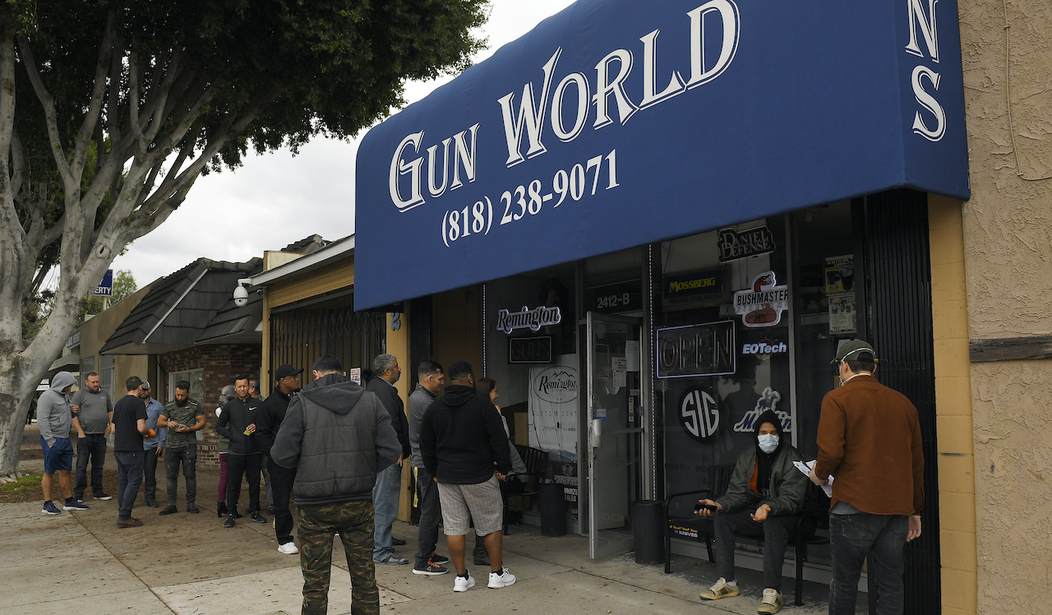Poor George Skelton. The Los Angeles Times columnist has covered California politics for 60 years, according to his bio at the paper, and yet in all those decades he’s apparently never comprehended a fundamental truth about the vast majority of the state’s gun control laws: they can’t be proactively enforced, and instead generally only come into play after a crime has been committed.
Skelton’s latest column focuses on the monstrous murders of three children and their guardian, killed by little girls’ father, who was not only illegally possessing a gun he’s not allowed to own in California, but was in fact in the United States illegally as well. Skelton at least acknowledges that fact, and he’s not exactly dismissive about the idea that David Mora should have been taken into ICE custody after he was arrested for assaulting a police officer days before he killed his children and their court-appointed guardian during what was supposed to be a supervised visitation.
Federal immigration agents tried to detain Mora. But because of California’s sanctuary law, “the jail was unable to hold him or communicate with ICE about his release and he walked out” on $15,000 bail, the investigating Sacramento County Sheriff’s Office reported Friday.
“This unspeakable tragedy highlights the true cost, unintended or not, of sanctuary policies that prevent law enforcement from protecting its citizens,” said Sacramento County Sheriff Scott Jones, who’s running for Congress as a Republican.
The sheriff’s sweeping statement is arguable.
There was a last-minute compromise forced by Gov. Jerry Brown on the sanctuary bill before it passed the Legislature in 2017. The measure, by then-Senate leader Kevin de León — now a Los Angeles City Council member and mayoral candidate — denied California help to federal agents trying to deport people who came here illegally but, like most, are staying out of trouble. The compromise meant ratting out bad guys to the feds.
Leave the good ones alone and kick out the bums. Around 800 crimes were listed as qualifiers for bum status.
But if Mora did not meet the criteria for being turned over to customs agents, then the sanctuary law should be toughened up. He clearly should have been deported.
Immigration law isn’t the real focus of Skelton’s column, however, and it’s not just the state’s sanctuary law that needs to be “toughened up,” according to him. No, Skelton seems to believe that if the state just spends a ton of cash, they can dramatically improve the effectiveness of the state’s gun control regime.
There should be more thorough investigations with in-depth interviews of domestic violence victims when they seek restraining orders. And if the target is found to possess a firearm, confiscate it immediately. That would require more money.
The statewide data system is also decrepit and information about restraining orders isn’t circulated widely, if at all. Bonta wants money to beef it up.
There’s a gun violence restraining order that’s focused on firearms. It involves local “red flag” programs aimed at people judged by a court to be potential killers. Their weapons are confiscated immediately.
“Red flags are underutilized,” Bonta says.
There are about 24,000 Californians the attorney general’s office knows about who possess guns and legally shouldn’t. But it can’t recruit enough state officers to grab the weapons and make a dent in the list. The job is dangerous and the pay isn’t competitive.
“We have the most restrictive gun laws in the country,” says Sacramento County Dist. Atty. Anne Marie Schubert, who’s running for attorney general as an independent. “But you have to have the funding to take the guns off the street. There are ghost guns everywhere right now.”
As Skelton notes, the state’s Armed Prohibited Persons system has a list of well over 20,000 individuals who the state believes are in illegal possession of firearms right now, and yet the number of individuals on that list continues to grow, not shrink. Most of the issues can’t be blamed simply on not having enough state resources to go out and grab all the guns, either. The real problem is that the entire system is basically FUBAR at this point, as attorney Matthew Cubeiro detailed last year. Here are his conclusions, but I’d encourage you to read his entire report at The Truth About Guns.
While CA DOJ’s report attempts to cast the APPS program in a favorable light, a detailed analysis paints a different picture. CA DOJ has attempted to explain the drop in results for factors outside of its control, largely due to COVID-19. But the effectiveness of the APPS program has been declining since its inception—well before the pandemic.
More importantly, none of the case examples provided by DOJ in the report suggest the individual was misusing their firearm(s) or had any violent intentions. Instead, their only crime appears to have been caught up in the myriad of gun-control laws labeling them a “prohibited person” by the state of California.
Perhaps California’s limited law enforcement resources would be better spent addressing the actual criminal misuse of firearms, or even better, educating California gun owners on the knowledge, skills, and attitude necessary for the safe and legal use of firearms.
Beyond sidestepping the fundamental flaws in California’s APPS program, Skelton ignores the fact that the vast majority of the state’s restrictions on guns are A) aimed at legal gun owners and B) almost impossible to proactively enforce. The press is making a big deal of the fact that Mora possessed a “ghost gun,” for instance, but I’ve seen virtually no mention of California’s law requiring background checks on ammunition sales, which clearly didn’t prevent the killer from illegally obtaining bullets for his illegally-acquired rifle. Why would Skelton or anyone else believe that a law imposing more legal penalties on the possession of home-built guns would have any impact on violent criminals; or at least any impact that would stop them from carrying out their monstrous deeds?
It’s not a lack of funding that’s preventing these laws from being effective. Their failure is an inherent part of the law itself. These types of restrictions that focus on the inanimate object are never going to stop the individuals responsible for acts of violence, and after 60 years in politics I would have thought that Skelton would have figured that out by now, no matter how liberal his political leanings. Gun control has nothing to do with crime prevention. In fact, considering that gun control laws generally create new criminal offenses out of our right to keep and bear arms, I’d argue that the California’s gun control regime has done far more to fuel crime than fight it.









